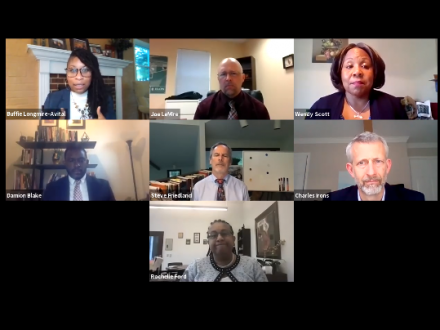During a panel discussion on April 28, Elon faculty and staff from the university and the school of law discussed the significance of the conviction of former police officer Derek Chauvin in the killing of George Floyd last year.
A panel of Elon experts from a variety of disciplines gathered online Wednesday night to digest the recent conviction of former police officer Derek Chauvin on murder charges in the death last year of George Floyd in Minneapolis and to look at what it may mean for police accountability and systemic inequity going forward.

The event brought together faculty and staff from the university and Elon Law to offer insights into the trial and its outcome, the next steps in the case against Chauvin and how his conviction could reverberate throughout law enforcement and in communities in the future.
Moderated by Assistant Professor of Political Science and Policy Studies Damion Blake, the panel included Senior Scholar and Professor of Law Steve Friedland, Associate Dean for Academic Success and Professor of Law Wendy Scott, School of Communications Dean Rochelle Ford, Professor of History Charles Irons, Associate Professor of Psychology Buffie Longmire-Avital and Elon Campus Safety & Police Chief Joe LeMire.
Offering general reactions to the outcome of Chauvin’s trial, many panelists said that despite the strong case made by the prosecution based upon an eyewitness video documenting Floyd’s death, there was still apprehension while waiting for the verdict that Chauvin would be convicted. “I still had some doubts in my mind that the verdict would be what it was,” Scott said.
Irons noted the relief he felts when the jury returned a verdict finding Chauvin guilty on all counts, the most serious of which was second-degree murder. Feeling that sense of relief was somewhat embarrassing, given the strength of the evidence in the case, but there is the weight of history of the criminal justice system not holding White law enforcement officers accountable for killing Black people.
“It’s weird to feel relieved about something that should be the normal course of justice,” Irons said.
Ford said that the day the verdict was returned, she was in a conference call with corporate communications leaders, and many of them were preparing dual statements about the outcome of the case – one if Chauvin was found guilty and one if he was found not guilty. That speaks the the uncertainty of the outcome despite the strong case made by prosecutors. “There was so much doubt that justice would happen,” Ford said.
The fact that the criminal justice system found Chauvin guilty in this case does not automatically restore confidence in the system, Longmire-Avital said. Chauvin’s conviction followed widespread public awareness and outrage over Floyd’s death and advocacy on behalf of his family and loved ones. There are far more cases that also cry for justice but that have not received as much attention, she said.
“I don’t think we can take a collective breath,” Longmire-Avital said. “We need to push on until we get to a place where we know without a shadow of a doubt what the verdict is going to be.”
The key elements of the case against Chauvin that led to his conviction were the eyewitness video as well as the willingness of Chauvin’s colleagues and the chief of his department to break the “blue code of silence” that has historically kept officers from speaking out against their fellow officers. The fact that Chauvin was held accountable was almost “coincidental,” Friedland said. Had an 18-year-old woman not been present and filmed Floyd’s death, the official narrative offered by police that Floyd died from medical complications would have defined his death, he said.
“This case could have been a very different case,” Friedland said.
Asked about police training, LeMire said that all officers are taught to use the least amount of force necessary for an arrest. They are also bound to step in if they see a fellow officer endangering a member of the public. Neither of those guidelines were followed in this case, LeMire said. It’s important to discipline and even terminate officers for misconduct, LeMire said, and the establishment of a national database of officers who had been terminated for cause could keep bad officers from jumping from department to department.
Executive leadership is also critical in law enforcement departments, LeMire said. That is critical when leading people who have been armed and given the authority to make arrests and use those weapons if needed. ” I have to hold you to a higher standard that any other job in this country because you are possessing that massive authority,” LeMire said.
Panelists noted that the Chauvin case is not over, due both to the fact that sentencing won’t take place until June at the earliest, as well as the widespread trauma that this case has caused. Longmire-Avital detailed studies that have shown the physical and emotional impact that racism and systemic inequities have had upon Black people and other minorities. There is an emotional toll that comes with questioning your safety in the presence of law enforcement officers and lacking confidence that the criminal justice system will deliver true justice, she said.
“What we saw in this case, what led up to this, has its roots in history and the very conception of the purpose of the black body and its value,” Longmire-Avital said. “We have to consider how profound this impact is.”



